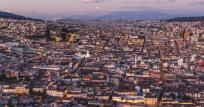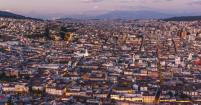

A Renewable Urban Agenda
Newsletter
“By readdressing the way cities and human settlements are planned, designed, financed, developed, governed, and managed, the New Urban Agenda will help to end poverty and hunger… reduce inequalities, promote sustained, inclusive, and sustainable economic growth, achieve gender equality… improve human health and well-being, as well as foster resilience and protect the environment,” declares the New Urban Agenda, the world’s latest commitment to develop sustainable cities.
Adopted on 20 October at the Habitat III conference in Quito, the principles of the New Urban Agenda embrace sustainable energy to drive economic prosperity and social well-being.
“Cities are realising that renewables offer an effective means to address climate change and reduce air pollution, while helping solve a host of social, economic and environmental challenges,” says IRENA Director-General, Adnan Z. Amin. “Sharing experiences and strengthening collaboration among stakeholders in the urban energy agenda is key to accelerating the deployment of sustainable energy solutions.”
The recent forum, RE-energising Cities: Renewable Energy in Urban Settings, exemplifies this kind of collaboration. Co-hosted with the governments of Ecuador, Germany, and the United Arab Emirates, the forum highlighted the critical role of renewable energy as a means to achieve a sustainable urban future. The several hundred attendees included mayors, city planners, and policy makers from around the world, who shared experience, strategies, and solutions for furthering renewable deployment and taking advantage of its multiple benefits.
One solution with many options
“Every city is different, but one thing they all have in common is that each can find a renewables solution that meets their needs,” said Elizabeth Press, Director of Planning and Programme Support at IRENA, during the opening session of the event as she described the sustainability challenges and solutions of growing modern cities. “There are many renewable energy technology options today — they are cost-effective, they are available to everybody, and they need to be harvested,” Press said.
Event participants acknowledged that renewable sources, coupled with energy efficiency, can provide sustainable energy solutions for cities around the globe. They highlighted that renewable energy aligns the 2030 Agenda for Sustainable Development with climate objectives.
“Renewable energy will be used [in Barcelona] to assist with mobility. We have a very serious problem with private mobility that’s related to the consumption and dependence on oil,” says Janet Sanz, Deputy Mayor of Barcelona, Spain. “We’re looking to change this model so that most transport is public and collective,” Sanz said, describing Barcelona’s ongoing effort to integrate infrastructure and policies related to improving personal mobility, like trams, with policies aimed at promoting renewable energy.
Some of the key issues and action areas identified by the participants during the event included:
- Rapidly falling costs for renewable energy technologies and how it is accelerating deployment in a growing number of cities;
- Driving renewable deployment through city empowered building codes and procurement and potentially having more influence over power generation;
- Further strengthening capacity building at both city and municipal levels;
- Expanding access to finance to scale up renewables in cities around the world;
- Strengthening partnerships and cooperation at the national and international level;
- The need for comprehensive planning towards sustainable urban energy systems;
- Achieving objectives through long term visions supported by citizens.
To learn more about IRENA’s participation at Habitat III and the role of renewables in sustainable cities, read our other newsroom piece, or watch the full recording of the RE-energising Cities streamed event on YouTube.




